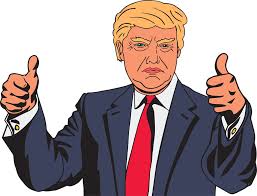
Over the course of of ten weeks, we recently ran a series of blog posts that take a close look at the Democratic Party candidates for President in 2020. We examined each candidate’s historic approach to marijuana law and policy, and we also canvassed their current respective stances on marijuana.
In all, we covered Joe Biden, Bernie Sanders, Kamala Harris, Elizabeth Warren, Pete Buttigieg, Corey Booker, Beto O’Rourke, Andrew Yang, Amy Klobuchar and Julián Castro. Today, we conclude by turning our focus on the President of the United States and presumptive Republican Party nominee, Donald Trump.
Grade: D+
Stance on marijuana: Donald Trump’s stance on marijuana is unclear. He has expressed support for medical marijuana as well as for allowing states to decide whether to legalize or not. As president, however, his rhetoric and actions have flip-flopped.
History with marijuana legislation: During his 2016 presidential campaign,Trump asserted that, as president, he would allow states to choose whether to legalize marijuana without interference from the federal government.
After his election, however, Trump’s position completely reversed. In 2017, then-Attorney General Jeff Sessions rescinded the Cole Memo, an Obama-era policy of not interfering with states who have legalized marijuana. Trump’s Press Secretary at the time, Sean Spicer, then implied that there would be a crackdown on legalization states. Sessions, however, did not specifically order law enforcement to direct more resources toward enforcing marijuana laws.
In April, Trump said that he would probably sign the bi-partisan STATES Act, a bill that would amend the Controlled Substance Act to allow states to legalize marijuana. Under Trump, current Attorney General William Barr, while not necessarily pro-legalization, has said that he wants Congress to approve legislation that would end the conflict between federal and state laws surrounding marijuana. As the 2020 election draws nearer, the Trump administration’s support of pro-legalization legislation is likely a strategic move considering that the majority of Americans support legalizing marijuana.
Though Trump has supported the STATES Act, he has not advocated for legalizing marijuana. Marijuana does not appear on his website or social media. Recently, Trump has asserted that, if reelected, he would allow states to legalize without federal interference. Unfortunately, he has not said he would reschedule marijuana. Even if states can legalize marijuana, marijuana’s status as a schedule I drug is a substantial barrier to research and prevents veterans from being able to get their medical marijuana prescriptions through the VA.
More broadly, Trump has perpetuated the War on Drugs, a campaign which has imprisoned countless Americans on drug charges (including convictions for marijuana) and fueled violent drug cartels over the past few decades. In 2017, Trump complimented Philippine President Rodrigo Duterte on his policy of extrajudicial killing of drug users. This year, Trump pressured Mexico to bolster their military efforts to stop drug trafficking by threatening to impose tariffs on the country. He justifies his border wall as a way to stop drugs from entering the US, despite the fact that most drugs are trafficked into the US through legal ports.
Over the past few decades, multiple studies have concluded that military intervention is ineffective in stopping the drug trade. Crackdown efforts instead end up increasing the value of drugs (because the stakes for trafficking them are higher) and in turn fuel drug cartels. Simply put, the drug trade will continue as long as there exists a demand for drugs in America.
Though Trump has allocated funds for addiction treatment programs, it is nowhere near adequate to address America’s opioid epidemic.
In his favor, Trump signed “The First Step Act” into law which, among other things, will reduce the minimum sentences for certain non-violent drug crimes. Current Attorney General Barr also seems more open to criminal justice reform than Sessions (a shift from the “tough on crime” stance he maintained in the 90s as Attorney General for President George H.W. Bush). His administration, however, is yet to acknowledge the criminalization of marijuana (and, more broadly, the War on Drugs) as a criminal justice issue. People of color are disproportionately arrested for marijuana, despite similar rates of marijuana use across racial groups. Marijuana must be legalized across all 50 states in order to stop the perpetuation of racism in our justice system.
Conclusion: Donald Trump receives a “D+” grade because his administration rescinded the Cole Memo and called for a crackdown on legalization states and because he broke his campaign promise to let states decide whether or not to legalize. More generally, his promise to let states choose whether to legalize would still leave marijuana illegal at the federal level. His inconsistency on cannabis is the biggest issue. He will say one thing and then do something completely different. His actions often do not match his words.























